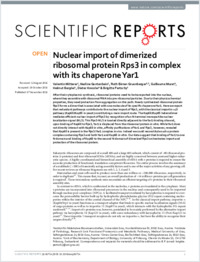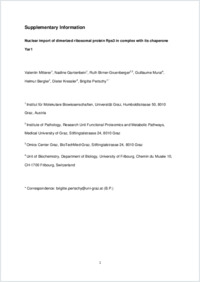Nuclear import of dimerized ribosomal protein Rps3 in complex with its chaperone Yar1
- Mitterer, Valentin Institut für Molekulare Biowissenschaften, Universität Graz, Austria
- Gantenbein, Nadine Institut für Molekulare Biowissenschaften, Universität Graz, Austria
- Birner-Gruenberger, Ruth Institute of Pathology, Research Unit Functional Proteomics and Metabolic Pathways, Medical University of Graz, Austria - Omics Center Graz, BioTechMed-Graz, Austria
- Murat, Guillaume Unit of Biochemistry, Department of Biology, University of Fribourg, Switzerland
- Bergler, Helmut Institut für Molekulare Biowissenschaften, Universität Graz, Austria
- Kressler, Dieter Unit of Biochemistry, Department of Biology, University of Fribourg, Switzerland
- Pertschy, Brigitte Institut für Molekulare Biowissenschaften, Universität Graz, Austria
-
07.11.2016
Published in:
- Scientific Reports. - 2016, vol. 6, p. 36714
English
After their cytoplasmic synthesis, ribosomal proteins need to be transported into the nucleus, where they assemble with ribosomal RNA into pre-ribosomal particles. Due to their physicochemical properties, they need protection from aggregation on this path. Newly synthesized ribosomal protein Rps3 forms a dimer that is associated with one molecule of its specific chaperone Yar1. Here we report that redundant pathways contribute to the nuclear import of Rps3, with the classical importin α/β pathway (Kap60/Kap95 in yeast) constituting a main import route. The Kap60/Kap95 heterodimer mediates efficient nuclear import of Rps3 by recognition of an N-terminal monopartite nuclear localization signal (NLS). This Rps3-NLS is located directly adjacent to the Yar1-binding site and, upon binding of Kap60 to Rps3, Yar1 is displaced from the ribosomal protein in vitro. While Yar1 does not directly interact with Kap60 in vitro, affinity purifications of Yar1 and Rps3, however, revealed that Kap60 is present in the Rps3/Yar1 complex in vivo. Indeed we could reconstitute such a protein complex containing Rps3 and both Yar1 and Kap60 in vitro. Our data suggest that binding of Yar1 to one N-domain and binding of Kap60 to the second N-domain of dimerized Rps3 orchestrates import and protection of the ribosomal protein.
- Faculty
- Faculté des sciences et de médecine
- Department
- Département de Biologie
- Language
-
- English
- Classification
- Biological sciences
- License
-
License undefined
- Identifiers
-
- RERO DOC 278416
- DOI 10.1038/srep36714
- Persistent URL
- https://folia.unifr.ch/unifr/documents/305365
Other files
Statistics
Document views: 113
File downloads:
- pdf: 192
- Supplementary material: 184

